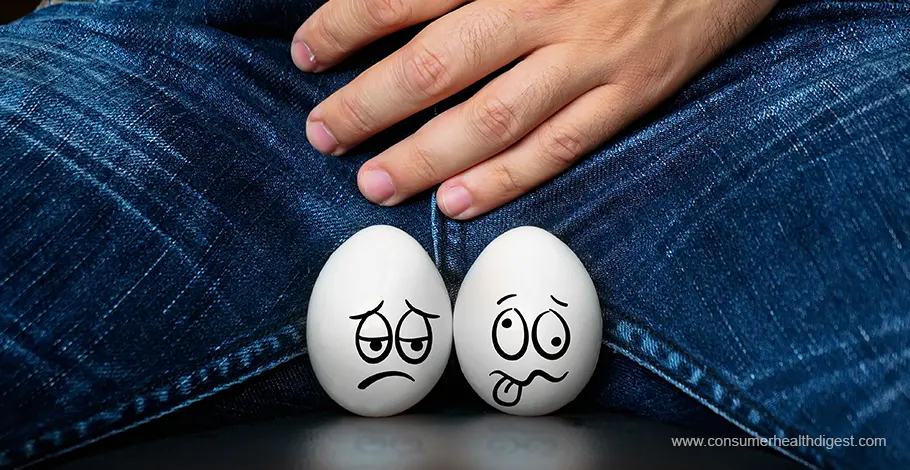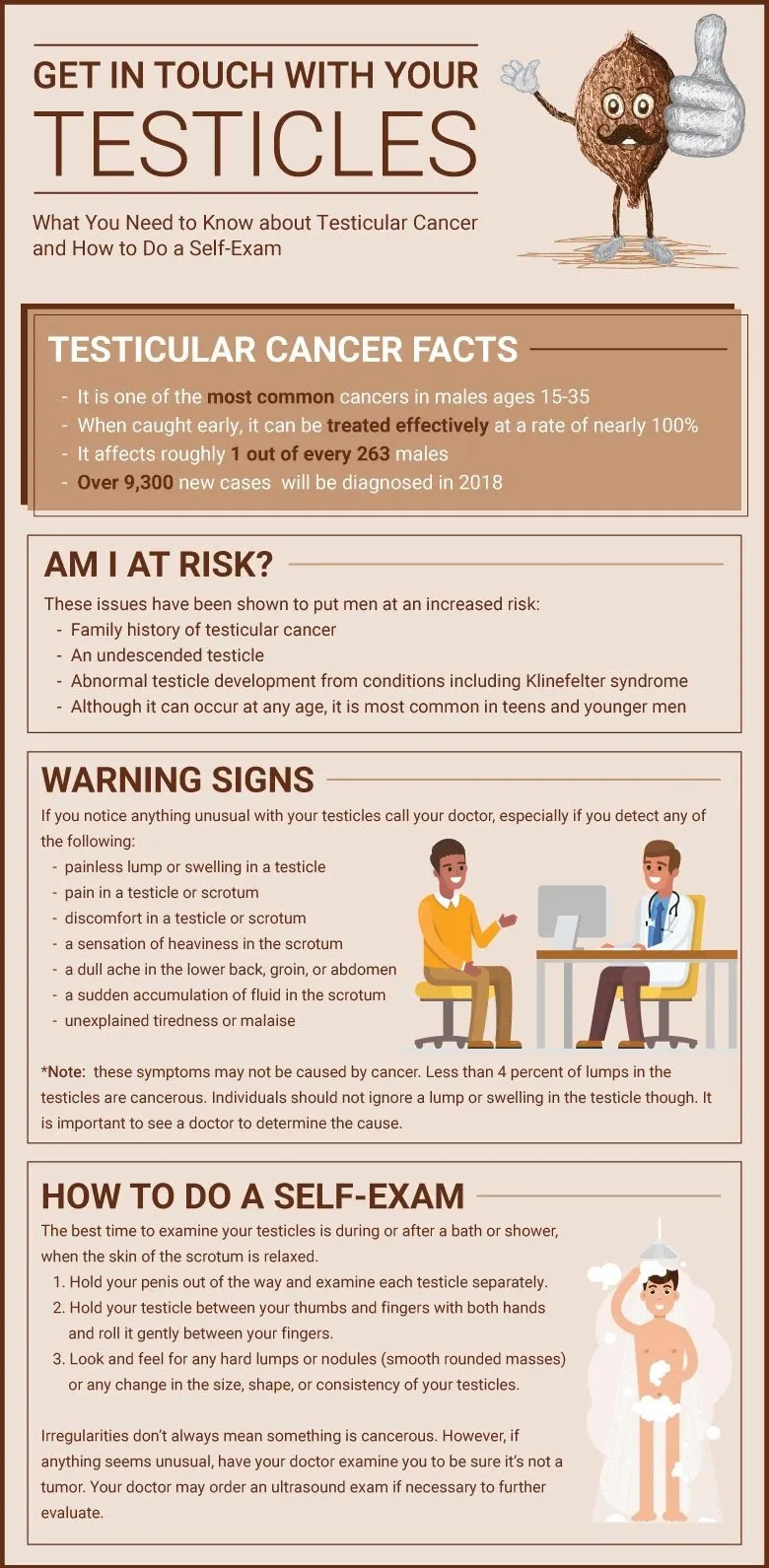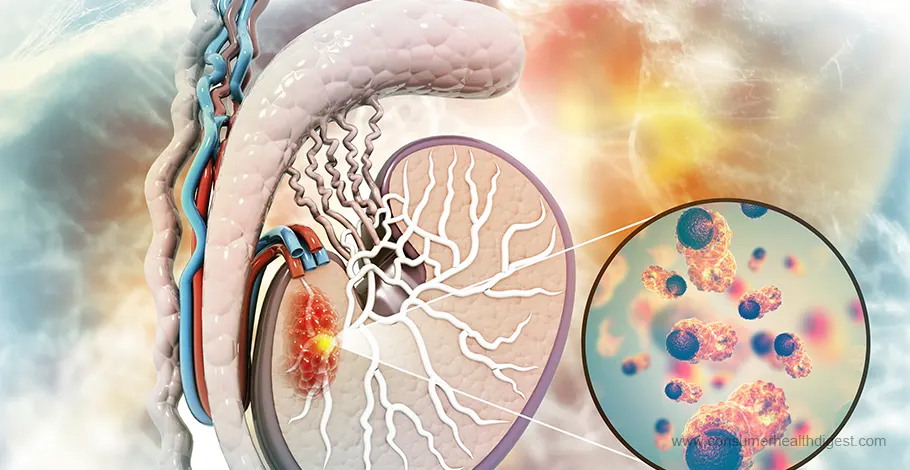Introduction
Men tend to overlook their health, putting off routine checkups or dismissing minor issues. But it's important to take responsibility for our health, particularly when it comes to a disease like Testicular Cancer. [1]

Despite being uncommon, this illness can affect men of all ages and socioeconomic backgrounds, thus early detection and awareness are crucial. We may protect our manhood and guarantee a healthier future by being aware of the hazards, spotting the warning signals, and acting early.
Understanding Testicular Cancer

Testicular Cancer info. Shutterstock Image
Tumor formation from testicular cells is the cause of testicular cancer. This is not common. The germ cells that create sperm are the starting point of more than 90% of testicular malignancies.
One or both of the testicles, the male reproductive organs that produce testosterone and sperm, can develop testicular cancer. Though it can happen at any age, men between the ages of 15 and 35 are the ones who are most affected. Testicular cancer can be classified into two primary categories: seminoma and non-seminoma. [2]
Testicular cancer that grows more slowly, known as seminoma, usually affects older men. Chemotherapy and radiation therapy often work well on these cancers. On the other hand, non-seminoma tends to affect younger men and is more aggressive. There are other subtypes of this form of testicular cancer, such as choriocarcinoma, teratoma, embryonal carcinoma, and yolk sac carcinoma. Even while non-seminomas grow quickly, they are frequently quite curable if detected early.
Causes And Risk Factors
There are several risk factors known for testicular cancer, even if its precise cause is still unknown. The most important are called undescended testicles, which occur when one or both testicles do not fall into the scrotum from the belly before birth. Even after corrective surgery, men with this condition have an increased risk of testicular cancer. [3]
The history of the family also matters. Your risk goes up if you have a close family, like a father or brother, who has been diagnosed with testicular cancer. Another determinant is age, with men between the ages of 15 and 35 having the highest occurrence.
Genetic disorders like Klinefelter syndrome, chemical exposure, HIV infection, and even regular cannabis usage are other possible causes and risk factors. It is crucial to remember that the presence of one or more of these risk factors does not guarantee the development of testicular cancer.
Signs And Symptoms

Signs And Symptoms of Testicular Cancer. Shutterstock Image
A bulge or enlargement in one or both testicles is the most typical sign of testicular cancer. This lump may not hurt, but it can also make your scrotum feel heavy or ache dullly. Back pain, a sensation of unevenness or soreness in the testicles, and, in rare instances, breast tissue enlargement or tenderness owing to hormone imbalances brought on by the malignancy are additional symptoms.
It's crucial to understand that, particularly in the early stages, some men with testicular cancer may not exhibit any symptoms at all. This is why it's so important to do routine self-examination and to see a doctor right away if anything changes. [4]
Early Detection and Self-Examination
For testicular cancer to be successfully treated and recovered, early identification is essential. Frequent testicular self-examinations can improve your chances of success by assisting you in spotting any alterations or abnormalities early on. Here's how to carry out a self-evaluation:
- 1. Examine your testicles in front of a mirror after taking a warm bath or shower.
- 2. Using your thumb and fingers, gently roll each testicle to feel for any lumps, swelling, or changes in size or shape.
- 3. Examine and record any abnormalities in the epididymis, a soft, tube-like tissue located behind each testicle.
- 4. Conduct a check-up once a month and notify your healthcare provider right away of any problems
Diagnosis and Treatment
It's critical to get medical help as soon as you discover any worrisome changes or symptoms. Your doctor will probably do a physical examination, prescribe an ultrasound, and run blood tests to look for high levels of tumor markers including lactate dehydrogenase (LDH), human chorionic gonadotropin (HCG), and alpha-fetoprotein (AFP). [5]
An orchiectomy—the removal of the afflicted testicle—may be advised if testicular cancer is suspected. This process is a component of the treatment as well as a diagnostic one. Additional treatments like radiation therapy or chemotherapy may be required, depending on the cancer's stage and type.
While chemotherapy uses potent medications to target and eliminate rapidly dividing cancer cells, radiation therapy uses high-energy beams to kill cancer cells and reduce tumors. Depending on your oncologist's recommendations and the specifics of your situation, you may choose to take any one of these treatments alone or in combination.
Prevention and Awareness
Although there is no 100% guarantee that testicular cancer won't develop, leading a healthy lifestyle and being aware of the warning signs and symptoms will help greatly. Your overall risk of cancer can be decreased with regular exercise, a healthy diet high in fruits and vegetables, and abstaining from smoking and excessive alcohol use.
It is imperative to increase testicular cancer awareness, particularly among young men. You may save lives by teaching others and yourself the value of self-examinations and by getting medical help as soon as you have any concerns. To dispel the stigma associated with men's health issues and promote proactive care, have candid discussions with friends, family, and medical experts. [5]
Conclusion
Although testicular cancer is a dangerous illness, it is also very curable, particularly if detected early. You may protect your manhood and lower your chance of this disease by being proactive about your health, doing routine self-examinations, and getting medical assistance as soon as you feel sick. Keep in mind that investing in your health is an investment in your future because it is your most valuable asset. Accept your health and don't be afraid to ask for assistance when you need it.
By working together, we can increase awareness, encourage early detection, and provide support to testicular cancer patients. It's a significant act of self-care to take proactive measures to protect your beautiful masculinity. Remain alert, keep knowledgeable, and always put your health first. You'll be grateful to yourself in the future.
5 Sources
We review published medical research in respected scientific journals to arrive at our conclusions about a product or health topic. This ensures the highest standard of scientific accuracy.
[1] Gaddam, Shiva Jashwanth and Gregory T. Chesnut. "StatPearls [Internet]." Testicle Cancer. StatPearls Publishing, 27 May. 2023, www.ncbi.nlm.nih.gov/books/NBK563159.[2] Types of Testicular Cancer | SEER Training. (2019, May 21). Retrieved from https://training.seer.cancer.gov/testicular/intro/types.html
[3] Yazici S, Del Biondo D, Napodano G, Grillo M, Calace FP, Prezioso D, Crocetto F, Barone B. Risk Factors for Testicular Cancer: Environment, Genes and Infections-Is It All? Medicina (Kaunas). 2023 Apr 7;59(4):724. doi: 10.3390/medicina59040724. PMID: 37109682; PMCID: PMC10145700.br> [4]Testicular Cancer Signs and Symptoms. (2024, April 22). Retrieved from https://www.cancer.org/cancer/types/testicular-cancer/detection-diagnosis-staging/signs-and-symptoms.html
[5] Testicular cancer - Diagnosis and treatment - Mayo Clinic. (2022, October 21). Retrieved from https://www.mayoclinic.org/diseases-conditions/testicular-cancer-care/diagnosis-treatment/drc-20352991







 This article changed my life!
This article changed my life! This article was informative.
This article was informative. I have a medical question.
I have a medical question.
 This article contains incorrect information.
This article contains incorrect information. This article doesn’t have the information I’m looking for.
This article doesn’t have the information I’m looking for.